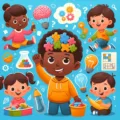Self-control is an essential skill that children need to learn to navigate through life’s challenges effectively. Teaching kids how to manage their emotions and behaviors can lead to better outcomes in school, relationships, and overall well-being. In this article, we will explore several strategies that can help children develop self-control.
Understanding Self-Control in Children
Self-control, often referred to as self-regulation, is the ability to control one’s emotions, thoughts, and behaviors in the face of temptations and impulses. A child with good self-control can wait for their turn, resist the temptation of immediate gratification, and stay focused on a task.
Establish Routines and Expectations
Routines provide structure and predictability, which are critical for children’s development of self-control. By establishing clear expectations and consistent routines, children can learn to anticipate what is expected of them and manage their behaviors accordingly.
Model Self-Control
Children learn a great deal from observing adults. When parents and caregivers demonstrate self-control, children are more likely to imitate those behaviors. It’s important to practice what you preach when it comes to self-regulation.
Teach Problem-Solving Skills
Teaching children how to approach problems and come up with solutions helps them develop the ability to think before they act. Encourage children to talk about their feelings and brainstorm different ways to handle challenging situations.
Use Positive Reinforcement
Positive reinforcement can be a powerful tool in teaching self-control. Praise or reward children when they exhibit self-control. This will help them understand the value of managing their impulses and encourage them to continue practicing self-regulation.
Practice Delayed Gratification
Teaching kids to wait for something they want is a key component of self-control. Simple games and activities that require waiting can help children learn the benefits of delayed gratification.
FAQ About Self-Control for Kids
- How early can self-control be taught to children?
- Self-control can be taught to children as early as the toddler years. Simple games like ‘Simon Says’ can help toddlers begin to learn about impulse control and following directions.
- Can self-control impact a child’s academic performance?
- Yes, self-control is closely linked to academic success. Children who can manage their emotions and behaviors are more likely to stay focused on tasks and achieve their academic goals.
- Is self-control innate or learned?
- While some children may naturally have better self-control than others, it is largely a learned skill that can be developed with practice and guidance.
- What if my child struggles with self-control despite my efforts?
- It’s important to be patient and consistent. If your child continues to struggle with self-control, consider seeking advice from a pediatrician or a child psychologist.
- How can I make self-control fun for my child?
- Incorporate games and activities that promote self-control into your child’s routine. Make these exercises fun and engaging to keep your child interested and motivated.









